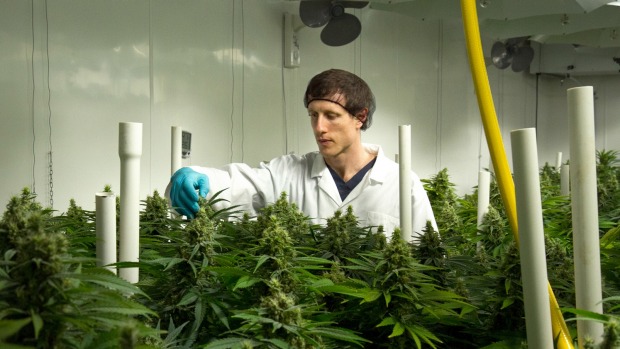
Calls for the use of medical marijuana in Australia are growing. Pictured: A facility in Canada. Photo: supplied
The medical community in Australia is split over the use of medical marijuana to treat conditions such as childhood epilepsy.
In the face of calls from parents for its availability, there is contention over the burden of proof that should be demanded before cannabis-derived pharmaceuticals are considered effective and safe.
Demands for the use of medical marijuana are growing, and one of Australia’s most prominent medical figures said last week that the epidemiological and anecdotal evidence for medical marijuana’s ability to control intractable epilepsy in children was “very strong”, and that its use should be supported.

Cannabis oil preparation for medical use. Photo: Rohan Thomson
But another expert, a Brisbane-based paediatrician, contends that claims marijuana products can control childhood epilepsy are unreliable and doctors should not encourage their use.
A key contention is the use of a marijuana-derived compound called cannabidiol – CBD – in the treatment of Dravet Syndrome, a devastating form of epilepsy that can induce more than 50 seizures a day in children.
Some experts claim CBD dramatically reduces, even eliminates, seizures. Others hold that the evidence is far from clear, and that black-market CBD preparations available in Australia could be dangerous.
“Anecdotal evidence is not sufficient evidence,” Dr Megan Yap, a paediatrician and pharmacist, said. Until recently, Dr Yap worked as a consultant to the Child Protection and Forensic Medical Services division of the Lady Cilento Children’s Hospital in Brisbane.
While at the hospital she said she was asked to examine cases of parents medicating their children with marijuana products.
The experience prompted Dr Yap, and some of her colleagues, to undertake a systematic review of all existing scientific studies into the use of cannabidiol in the treatment of epilepsy.
The resulting paper, published in May in the Journal of Paediatrics and Child Health, concluded that previous studies “were poorly designed and too small to extrapolate reliable conclusions about clinical use”.
She has called for clinical and long-term safety trials to be conducted before paediatricians should consider advising the use of CBD.
Former head of the University of Melbourne medical school, Professor Emeritus David Penington, agreed that clinical trials were needed before doctors could prescribe CBD, but said there was plenty of evidence from around the world that the treatment worked.
He said there were also a number of parents in Australia already using it to treat Dravet Syndrome.
“No it’s not available on prescription,” he said. “But where a patient wants it, they should be able to have it, after receiving advice from their doctor.”
Professor Penington is a former university vice-chancellor and member of the National Health and Medical Research Council. He was named Victorian of the Year in 2014, and has been a prominent voice in the debate over the legalisation of marijuana for several years.
He said any threat of prosecution over the use of CBD would have severe consequences for families around Australia already sourcing it illicitly.
“These people want to continue to use it,” he said. “In reality, there are a number of families with children who have Dravet Syndrome who have found that preparations rich in CBD bring very significant release from symptoms.
“It’s not for doctors to prescribe, but it is important for those families to be able to continue to use it, with proper advice, until such time that it becomes legal.”
Dr Yap agreed that CBD appeared to have “a relatively good side-effect profile”, but said that the illegal nature of medical marijuana products meant it was impossible to ensure either consistent dosage size or purity.
“What dose are we giving?” she asked. “Is this consistent and reproducible? Is it safe? Are we giving THC, or CBD, or both? The answers to these questions are: we don’t know.”
She urged paediatricians to deal with cases of medical marijuana use in children sensitively, and on a case-by-case basis, with the emphasis firmly on ensuring the welfare of the child.
“Legality isn’t even a consideration in that question,” she said. “Is there harm being caused? That’s the question that matters.”
In Victoria, Premier Daniel Andrews has flagged his intention to present a bill legalising the use of medical marijuana at the end of this year.
A bill to change national marijuana laws was introduced into the Federal Parliament earlier this year by Greens senator Richard di Natale. It is expected to be debated next month.
